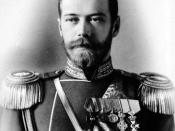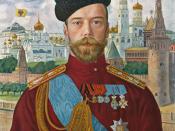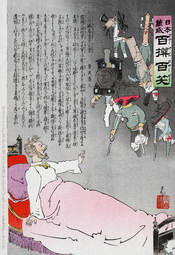By early 1917, the existing order in Russia was on the verge of collapse. The defeat by Japan in the Russo-Japanese War, the 1905 and 1917 revolutions, World War I are factors which resulted in the regime of the Tsar, Nicholas II, being unable to reform itself and the nation between 1905 and 1917. Other external and internal pressures on the Russian government, such as the Balkan crisis of 1908-1909, the growing discontent of the Russian people with the Tsar's government and the failing economy also contributed. Additionally, the approach to leadership of Russia held by Nicholas II further accounts for the defeat of the Romanov dynasty after more than three hundred years of rule.
The Tsar himself can certainly be held partly accountable for the inability of his regime to reform itself in the years between 1905 and 1917. Crankshaw commented that "the impact of Nicholas, considerable by all means, was almost wholly negative."
Other historians have observed similarly, that "he was the living negation the idea of autocracy." Much criticism has derived from the inability of Nicholas II to measure up to his father, Alexander III. Pares notes that "Nicholas II (was) brought up in the awesome presence of his father in a close atmosphere of domestic regulations and immensely impressed by his father's powerful personality." Undoubtedly, on coming to power in 1896, Nicholas II had set himself to continue the recuperation of Russia, which had marked the reign of his father.
However, there existed a tremendous contrast between what he was and what was expected of the Tsar. Sympathy exists, nevertheless, between some historians, who claim Nicholas II was known for his "earnest solicitude for all his subjects" and "the idea that he was stupid, was a sheer illusion confined to revolutionaries who knew...


